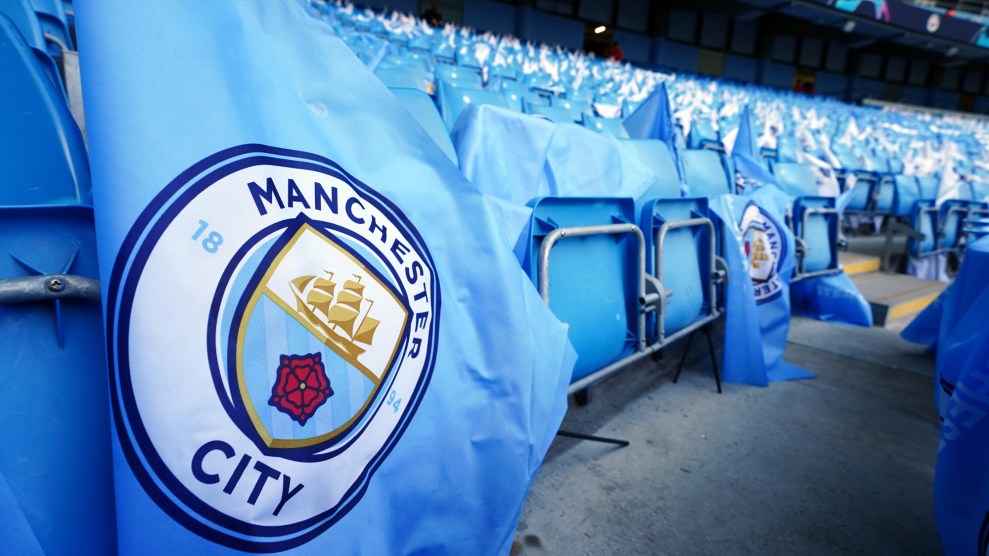
Martin Rickett/ PA Wire / ZUMA
Ever since its acquisition 15 years ago by Sheikh Mansour bin Zayed al Nahyan, a powerful member of the ruling family of Abu Dhabi, Manchester City Football Club has been the Future.
City has spent billions of dollars to become one of the world’s biggest soccer clubs, but its greatest innovations have come off the field. Although Mansour purchased the club through his private investment fund, the team’s management and finances are inseparable from the political and financial apparatus of Abu Dhabi and the United Arab Emirates, and it offered a model that Qatar (Paris St.-Germain) and Saudi Arabia (Newcastle United) have since followed. Then there was the club structure itself—Mansour didn’t just buy one team; he acquired a dozen clubs on five continents, pioneering an age of consolidation in which local teams are increasingly mere spokes in multi-club conglomerates. And City helped change the way soccer was financed, by selling a major stake in the club to private-equity investors. The Silicon Valley firm Silver Lake now owns 18 percent of City Football Group. (At the same time, the Abu Dhabi sovereign wealth fund has invested billions in Silver Lake.) As I wrote for the magazine last year, oil money, PE, and economic concentration have remade the world’s most popular sport over the last decade-and-a-half. City has been at the vanguard of soccer’s transformation.
But on Monday, that all-conquering business model ran into a wall. The English Premier League, in which City’s men’s team competes, charged the club with more than a hundred rules violations dating back more than a decade. If an independent commission finds City guilty, the club could be docked points in the standings (ruling them out of a title chase this season), stripped of previous trophies, or even kicked out of the league entirely. It’s a moment of reckoning for soccer’s Gilded Age.
The list of alleged transgressions is extensive. The league accused the club of failing to let investigators properly examine its financials. It alleged that the club had kept some of its expenditures off the books by paying a manager via another club Mansour also happened to own. And City allegedly inflated the value of sponsorship deals from UAE-based companies to circumvent rules governing how much money owners can inject into their team. That last one sounds kind of boring, but it’s really the heart of the matter, given that we’re talking about a multi-national entity that now has major private-equity backing. Just last month, Deloitte announced that City had the highest revenues of any soccer club in the world. If an owner who’s effectively a proxy for a nation-state can tap into unlimited funds in such a manner, it challenges the legitimacy of the sport’s entire financial structure.
City, which has denied any wrongdoing, issued a statement saying that “it welcomes the review of this matter by an independent Commission, to impartially consider the comprehensive body of irrefutable evidence that exists in support of its position.”
Club statement
— Manchester City (@ManCity) February 6, 2023
The current fight dates back to 2018, when Der Spiegel published a sweeping expose of Manchester City’s finances based on a trove of documents obtained by a Portuguese hacker—soccer’s version of Wikileaks. The leaks were a glimpse not just at City’s books, but its theory of power. In one leaked exchange, as reported by The Guardian, a lawyer for the club recounted its chairman’s assertion that rather than pay a fine to UEFA, the sport’s European governing body, for exceeding spending limits, “He would rather spend 30 million on the 50 best lawyers in the world to sue [UEFA] for the next 10 years.” Being able to spend with impunity was a principle worth going to the mattresses over.
Based on those leaks, UEFA banned the club in 2020 from competing in the continent’s most lucrative competition, the Champions League, for two seasons. City appealed the decision and managed to get the penalty thrown out by the Court of Arbitration for Sport (the preeminent adjudication panel for international athletics). CAS concluded that there “was a legitimate basis to prosecute MCFC,” but accepted the club’s argument that the statute of limitations had passed. The Premier League, though, has no such statute of limitations. The Monday announcement is sort of the sporting equivalent of someone being pardoned by Donald Trump only to get indicted by Tish James.
The current, plutocratic era of European men’s soccer has been defined by a kind of regulatory capture. In sports as in all else, the biggest clubs can afford to pay fines or expensive lawyers to keep doing business as they please. What’s $10 million if you’re a nation state? In threatening to hold the club to account for alleged transgressions by going after the one thing Manchester City treasures about all else—the image and prestige it bought—the Premier League is trying to regain some control over the sport’s growth, and send a message about who’s in charge. But if the favorite club of Abu Dhabi manages to wriggle its way out of this jam, it just might send a different signal instead.
















